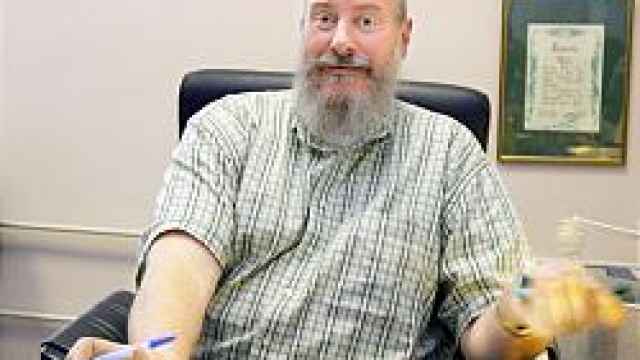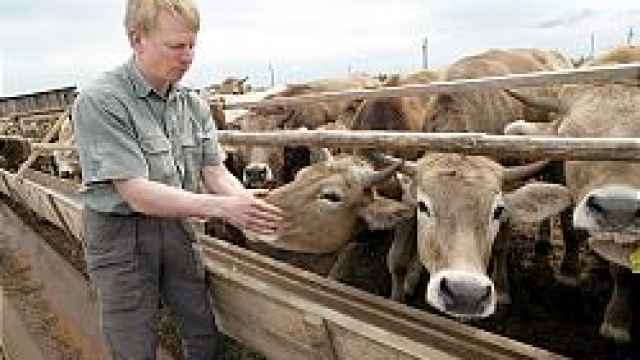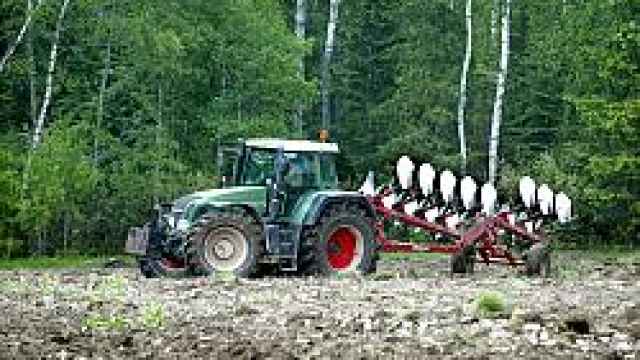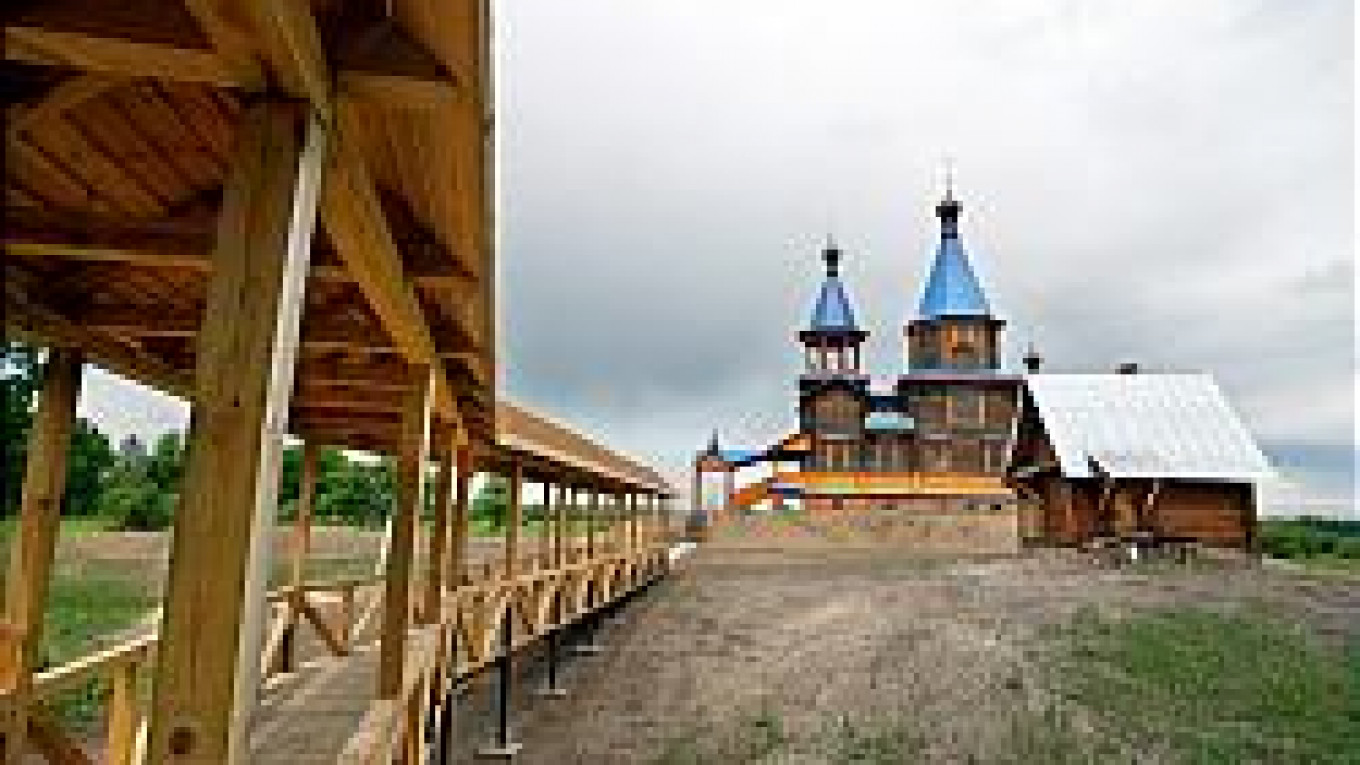The district seat and railway station of Petushki, immortalized by the late poet of Russian alcoholism and existential hopelessness Venedikt Yerofeyev in his masterpiece "Moscow Stations," is just 6 kilometers away, but there is no bus connection to it. The local school has only 20 children, and Krutovo's remaining 267 residents, who used to work at a now defunct sawmill and state farm, were destined to be as destitute as most of the rural population around them.
But John Kopiski, a British entrepreneur who found a new home in Russia, is trying to change Krutovo's fate.
Behind a metal fence topped with barbed wire and guarded by massive Caucasian shepherds -- a necessary precaution against rampant theft -- stand renovated barns and a pen for the farm's 700 head of fat Swiss Brown cows. Three flags fly on staffs in a neat flower garden in front of the one-story administrative building: the Russian tricolor, the Petushki district's insignia and the white-and-blue flag of Kopiski's farm, OOO Bogdarnya, which means God's Gift.
The farm, which four years ago was in the same state of ruin as others like it in the region, is the result of $2.5 million in investment -- something Kopiski today considers to be a mistake.
"I'd recommend to anybody who wants to invest in dairy farming to start on a green field site, rather than repair old buildings," he said in a recent interview in his Moscow office. "The start-up cost on the old farm was huge. We wasted a lot on repairs."
 Mike Solovyanov / MT John Kopiski, whose main business is coal, has made Russia his home since 1991. | |
Kopiski is about to get a chance to do it differently the second time around. Later this year, he plans to build a $4 million farm for 2,500 head of dairy cattle near the village of Rozhdestvo about 20 kilometers from here. Unlike Krutovo, whose traditional farm buildings are made of brick and designed to keep out the elements, the new farm will have modern, open structures and be more automated. Each cow will be equipped with sensors to monitor its condition, with the data processed and displayed on the manager's computer.
"The animals must be healthy: ventilated and cool. By the laws of nature, cows can live at temperatures down to minus 45 degrees Celsius," Kopiski said.
Kopiski's approach is not limited to the import of Western agricultural methods. As part of a community-building policy, which is particularly important since the farm has a hard time finding young workers who do not drink among the local population, Kopiski has helped repair the school and "house of culture" and bankrolled the construction of an elegant wooden church. On May 11, Archbishop Yevlogy of Vladimir and Suzdal consecrated the church.
"I believe that business should help the community," Kopiski said, mixing Russian and English words. "We built the church because we are Pravoslavniye [Orthodox Christian] people and because we hope it will help keep a community."
Kopiski, who is now 53, came to Russia 12 years ago after stints in Bangladesh, Pakistan, Hong Kong and South Africa to work on a coal and steel project for Balli Group, a London-based steel-trading company. After a two-day visit, he liked it so much that he resigned from the board and settled in Moscow.
In the coming years, he helped Russian partners market coal and privatize mines in Novokuznetsk. Today he said he owns 5 percent of Novokuznetsk-based Regionugol and runs its marketing arm in Moscow, called Michurinskugol.
 Vladimir Filonov / MT Janis Zeberlins is introducing new farming methods to help the cows stay healthy. | |
Within months after his arrival, he met Nina Kuzmichyova, who soon became his wife. Her condition for marrying him was that they stay in Russia, Kopiski said. Around the same time, he converted from Roman Catholicism to Orthodox Christianity.
"I just found a home in it [the Russian Orthodox Church]," he said. "I can't make it intellectual for you."
Apart from the coal business, which is still Kopiski's core activity, he and his wife also started several family businesses in Moscow: a Xerox shop and copy center near Taganka and conference and business centers in the Marriott and Baltschug-Kempinski hotels. Their latest venture -- a chain of children's clothing shops -- is to open in October.
They have four children -- the youngest is a little older than 1 year -- which Kopiski said contributed to a desire to live in the country. Back in 1993, they bought a dacha in the village of Bogdarnya not far from Krutovo. They built small chapels in Bogdarnya and Krutovo. In 1999, the reconstruction of Krutovo's farm began.
Although Kopiski has Russian citizenship, which he received five years ago, and his wife is Russian, he had to overcome much suspicion in the Communist-run region.
The Vladimir region's Prizyv newspaper wrote in 2000 that it had been flooded by letters and telephone calls from readers asking the paper to investigate how foreigners had managed to buy a farm.
Konstantin Poverinov, the mayor of Krutovo, said local residents had been afraid they would no longer be able to graze their own cows in the meadows. "When they realized they were not losing anything, it all settled," Poverinov said. "Of course, we lucked out."
"As soon as the authorities realized that we had come here to work, to solve the employment problem, so that people don't drink themselves into a stupor, the attitude changed," said Igor Dibushevsky, deputy director of the farm.
Even on the farm itself, the managers had to overcome old prejudices.
Last winter, much to the workers' initial distress, the calves were kept outside, even when the temperature dipped to minus 40 Celsius.
 Vladimir Filonov / MT A 270-horsepower, German-made tractor makes quick work of the long-neglected fields on the former state farm in Krutovo. | |
"I thought they would all die," said Zoya Kozlova, a milkmaid, as she fed mineral supplements to a herd of yearling calves. "But look what they've become! They are bison and not calves!"
Janis Zeberlins, a Latvian-born consultant who previously worked in Sweden and was brought in to run the new farm in Rozhdestvo, said the Russian tradition of keeping cattle in warm, sealed-up barns is a result of thinking of them in the same terms as people.
While people feel comfortable at about 20 degrees, the ideal temperature for cows ranges from minus 5 to plus 5. "Everybody knows it, but everybody is afraid of it," Zeberlins said.
The Krutovo farm, which produces about 5,400 liters of milk per day, sells its milk to a processing plant in Petushki for less than 5 rubles per liter, which Kopiski said is an unfairly low price. He said Danone has tested the milk and agreed to consider buying it when the new farm is operating and volume increases. Kopiski also is looking into the possibility of buying a plant to produce cheese.
Bogdarnya, which makes its own hay and silage, owns the 40 hectares of land on which the present and future farms stand and 1,400 hectares that Kopiski and his wife bought from individual collective farm members. The farm also has about 5,000 hectares on a 49-year lease from the local administration.
"In the West you say one cow needs one hectare of land," Kopiski said. "Here, yields are lower and the soil is sandy. We say we need two hectares per cow."
Alexander Funk, who previously worked as chief agronomist for the Rossia kolkhoz and now cultivates the same land for Kopiski, could not contain his excitement while watching a German-made 270-horsepower Fendt tractor easily pull a plow through a long-neglected field that had been encroached on by small birch trees spreading from adjacent woods.
"No one has touched this field for 15 years," he said, pointing to the birch trees, which were up to 1 1/2 meters high. "I still don't believe my eyes. I don't believe that I lived to see this and to be able to work with such equipment."
Kopiski's social program, however, is still far from bearing fruit. Despite attractive salaries -- of 4,000 rubles to 9,000 rubles ($129 to $290) per month, a fortune compared to what neighboring farms pay, when they pay -- Bogdarnya is having a hard time recruiting specialists and finding local residents willing to work.
Most young people are leaving for the cities. Only 15 of the Krutovo farm's 72 employees are locals and the remaining staff are bused in from Petushki. None of the farm workers attends the newly built church, said its priest, Father Sergy Glebov.
"To live here and not drink yourself into a stupor requires a great effort," said Drobyshevsky, the farm's deputy manager. "People who work with us have at least begun to believe in themselves."
A Message from The Moscow Times:
Dear readers,
We are facing unprecedented challenges. Russia's Prosecutor General's Office has designated The Moscow Times as an "undesirable" organization, criminalizing our work and putting our staff at risk of prosecution. This follows our earlier unjust labeling as a "foreign agent."
These actions are direct attempts to silence independent journalism in Russia. The authorities claim our work "discredits the decisions of the Russian leadership." We see things differently: we strive to provide accurate, unbiased reporting on Russia.
We, the journalists of The Moscow Times, refuse to be silenced. But to continue our work, we need your help.
Your support, no matter how small, makes a world of difference. If you can, please support us monthly starting from just $2. It's quick to set up, and every contribution makes a significant impact.
By supporting The Moscow Times, you're defending open, independent journalism in the face of repression. Thank you for standing with us.
Remind me later.


